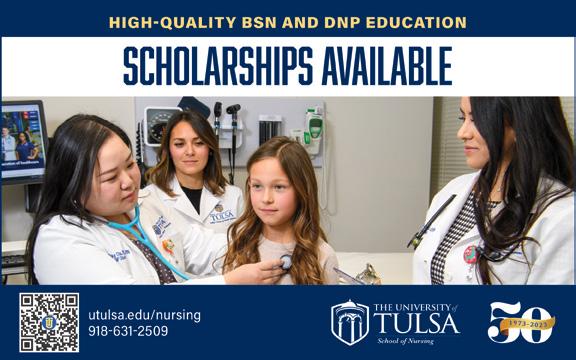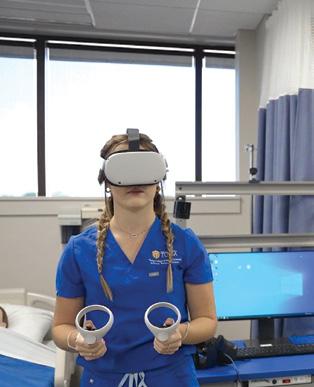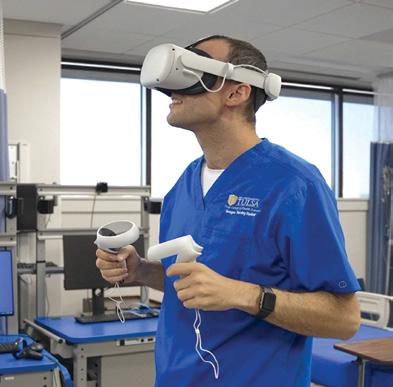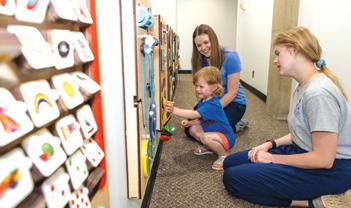
3 minute read
HANDS-ON HEALTH CARE
In one scene, a student uses an Oculus virtual-reality headset to navigate a virtual hospital and treat patients’ needs. In another, speech pathologists-intraining perform hearing tests on children at a public school.

Advertisement
And, in a well-lit coffee shop in a trendy part of town, the tapping on a laptop keyboard marks the finishing touches on a report that will be used by a major hospital system to improve patient care.
For some, these student experiences might sound aspirational – goals for health sciences educators when asked what they think would take a school and its students to the next level.
But at The University of Tulsa, these examples aren’t just grand ideas on a whiteboard. Undergraduate and graduate students at the Oxley College of Health Sciences combine the latest technologies with hands-on patient interaction and amazing opportunities to turn their research into real-world work that has an impact on their communities.
These works give them an edge in entering the workforce and furthering their academic goals as well, as they face what has become an increasingly competitive yet in-demand world of health care services.
“Some of the things that make us unique, that we pride ourselves on, is that regardless of what our students are going to do, we make sure those students have ample experiences and interactions outside of the traditional classroom,” said Ron Walker, interim dean of Oxley College. “It’s going to prepare them to be critical thinkers, to be contributors and to be servants to others.”
TU’s Oxley College students boast some of the highest board certification exam pass rates and employment placement rates in the nation, due in part to the extraordinary level of practical experience, close faculty interaction and plentiful opportunities to engage in research that can be put into practice outside the lecture halls.
“Our students are very comfortable and well-versed in their clinical skills before they enter a real-world setting,” Walker said. “They’re confident in what they’re doing and can focus on the patient.”
Oxley College currently comprises the School of Nursing, the Department of
Kinesiology & Rehabilitative Sciences and the Department of Communication Sciences & Disorders.
Last academic year, 232 students in these programs completed nearly 50,000 clinical hours, saw more than 19,000 patients and worked at 174 sites.
“Our undergraduate students have the opportunity to work with patients as a senior,” said Suzanne Thompson Stanton, chair of Communication Sciences & Disorders. “No other program in the area offers this to all seniors.”
Similar stories arise throughout the college.
“We have an experienced and cohesive nursing faculty who are experts in their areas of teaching and practice,” said Bill Buron, director of the School of Nursing, which is celebrating its 50th year in 2023.

For post-graduate students, similar results have been noted, with student support providing a key component to success.
“We have amazing scholarships,” said Sarah McAuliff, director of the family nurse practitioner program. “Most of our students get additional scholarship funding. This means that students are getting a private school education experience at a public education price. In most cases with additional scholarships,
College Level
100% job placement rate for five consecutive years
49,600 clinical hours across 168 sites serving 19,366 clients
SCHOOL / DEPARTMENT LEVEL
SCHOOL OF NURSING
100% Certification pass rate for students in the doctoral nursing programs
95%
Undergraduate pass rate on the National Council Licensing Examination
DEPARTMENT OF KINESIOLOGY & REHABILITATIVE SCIENCES
95% Master’s of athletic training students’ pass rate in board certification exams
DEPARTMENT OF COMMUNICATION SCIENCES & DISORDERS
94% Master’s of speech language pathology students’ rate on the national Praxis Examination the hourly tuition rate the student ends up paying is lower than the competitive local programs.”
Connections to the community, along with a long-term outlook and what students want to achieve, have been a TU hallmark. The school has partnerships with all three major Tulsa-area health systems, numerous clinics and a wide variety of places where students can put their classroom knowledge into practice.

“From the time (our) students step onto TU’s campus, we discuss five-, 10-, 20-year career goals,” said Eric Wickel, professor of kinesiology & rehabilitative sciences. “We, as faculty, use our professional networks to provide immersive experiences that directly speak to the students’ goals.”
To that end, students and alumni note how important their TU experience is in building a career.
“There are so many ways to get involved with community outreach and research, as well as gaining hands-on experience by assessing and treating a variety of issues,” said speech-language pathology graduate student Emma Clark (BS ’22).
“The education I received has allowed me to better influence health care policy in my organization, especially during the height of the COVID-19 pandemic,” said Leslie Petty (BSN ’83, DNP ’20), director of the Tulsa Day Center. “It bolstered my confidence by seeking out experts, analyzing and reporting data to meet the health care challenges associated with vulnerable populations. I have become an expert on what I am passionate about, which is caring for those who do not have a voice. I am greatly appreciative for the supportive faculty and the encouragement they provided.”
The evolution of Oxley College continues: Starting this fall, TU’s biology, chemistry, geosciences and physics departments will join nursing, kinesiology & rehabilitative sciences and communication sciences & disorders to form the new Oxley College of Health & Natural Sciences.








